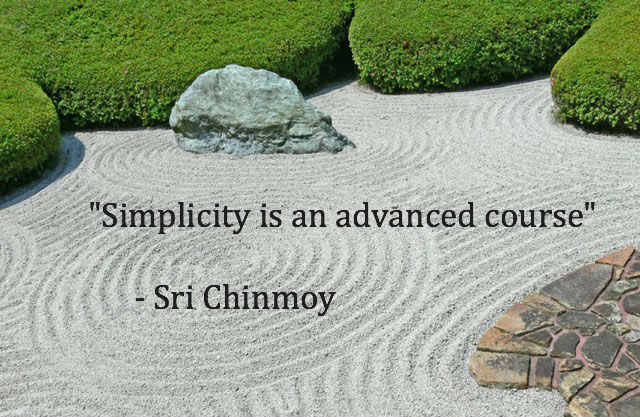Simplicity
is an advanced course.((Unsourced))
This saying from Sri Chinmoy encapsulates the paradox of simplicity: To enjoy the fruits of simplicity, we need to work hard to overcome our mind’s tendency to complicate, confuse and misunderstand.
Simplicity should come easily, naturally and spontaneously. But over the years, most of us have generated habits of thought and action that have caused us to forget this wonderful quality.
Real simplicity can have a liberating and calming effect on our life; simplicity has the power to overcome mental tension and create a climate of inner peace. A child can know and understand simplicity; it hasn’t yet developed the habit of complication and suspicion. If we are weighed down by the stresses and strains of life, how can we remember and re-vitalise our capacity to enjoy simplicity? Here are some tips to enjoy the fruits of simplicity.
Value simplicity
If we wish to achieve anything worthwhile in life, we need to value it. Because we value eating so much, we never miss a meal. If we value simplicity, we will always keep it in the forefront of our mind; and then when a choice presents itself between complication and simplicity, we will remember to pursue simplicity.
The power of the heart and spontaneity
If you have a train of thoughts going around in your mind, it can be confusing and difficult to come to a conclusion. But there is another part of us that can transcend the confusion of the mind. If we use the power of the heart, our intuition can come to the fore. Even though intuition is usually ignored until after the fact, it somehow knows what we should do. We need to learn to trust this part of ourselves and follow the quiet voice of our intuition. The heart, which opens the door to intuition, embodies a wonderful simplicity in contrast to our mind, which usually embodies complexity and uncertainty. Sometimes, we just need to think a little less and listen a lot more to our inner intuition.
Cut out the inessential
Whatever situation you are in, try to cut out the inessential. Take stock and evaluate what is important. If we start from scratch, it is much easier to build up a simple environment and a clutter-free agenda. Rather than making minor changes, look at your life from a completely different perspective – build up from a clear base.
Learn to say no
Modern life makes it easy to fall into habits that distract our attention. There is always something pulling us away, such as the beeping of a mobile phone or other technology; there are always emails to check and things to do. To get out of these habits requires a clear and determined approach and a willingness to say no to inessential tasks.
Clear environment
There is an old saying: Keep nothing in your house unless it is beautiful or useful. Simplicity is much more than a sense of space and tidiness. But, if our physical surroundings are a mess, then it will affect our attitude and approach to life. If we can create beauty and simplicity in our outer life, this will subtly affect our whole approach to life.
Don’t justify
Most of us habitually try to justify our opinions and our actions. But sometimes it is best to let actions speak for themselves. Rather than trying to explain why something should be done, lead by example. As soon as we try to explain and argue our point of view, others will offer different opinions and complications. The most powerful approach is to simply do. People will be inspired by our example much more than by our reasoning and our explanations. Sri Chinmoy summarises this ideal with a short poem.
I simply do
What many dream of.
I simply do
What others talk about.
I simply become
What others dare not even to imagine. ((Sri Chinmoy, Transcendence-Perfection, Agni Press, 1975.))
photo top: Kedar Misani

